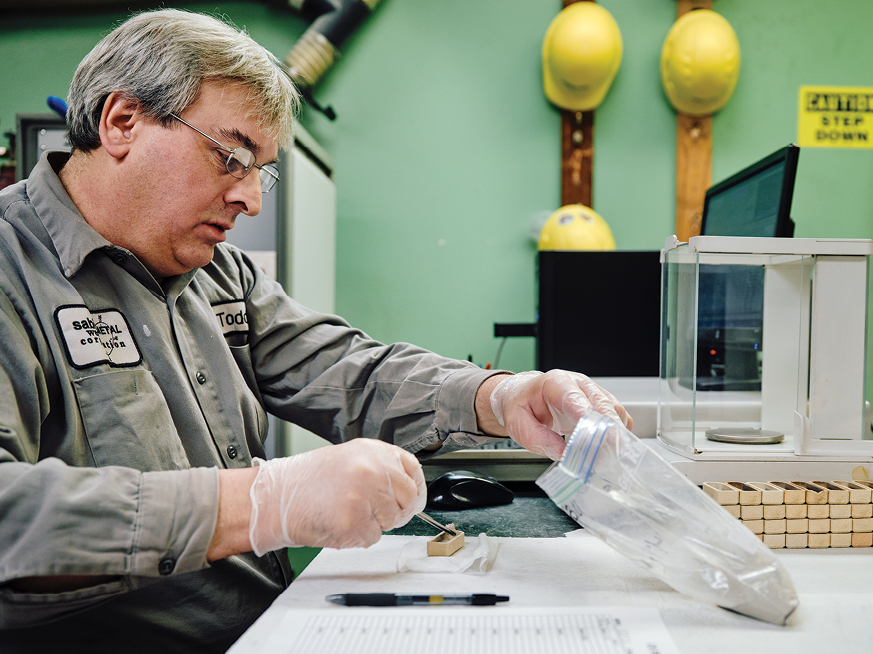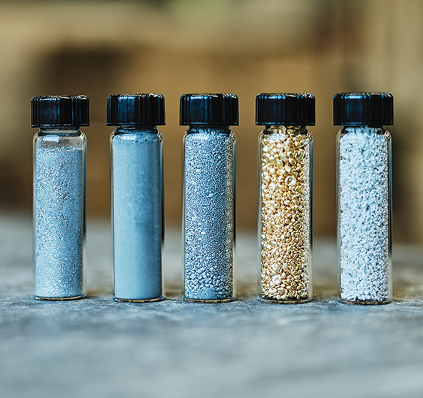- Home
- Media Kit
- MediaJet
- Current Issue
- Past Issues
- Ad Specs-Submission
- Ad Print Settings
- Reprints (PDF)
- Photo Specifications (PDF)
- Contact Us
![]()
ONLINE
![]()
ONLINE

Precious Metals
Editors’ Note
Andrew Sabin has worked in and around Sabin Metal Corporation since he was nine years old. He became President of the company in 1980 after the passing of his father, Samuel Sabin. He now sits as Chairman of the Board. During his time at Sabin Metal, he played a pivotal role in transforming the business. He founded Sabin Commodities, led the company’s international expansion, and guided its diversification into industrial catalysts. Sabin is a naturalist at heart and through his philanthropy he has helped protect habitats and animal species around the world. Sabin has served for several years on the environmental law advisory boards at Columbia Law School and UCLA School of Law, relationships that began through his role as treasurer of The Evan Frankel Foundation which made grants of more than $17 million during its 15-year existence. He is also a member of the board of visitors of the M.D. Anderson Cancer Center at the University of Texas. Sabin graduated from the University of Denver with a business degree.
Company Brief
Sabin Metal Corporation (sabinmetal.com) is the largest independently owned precious metal refiner in North America. Over the last seven decades, the company has honed its sampling, analysis, recovery, and refining techniques to deliver the highest returns in the industry. Sabin Metal Corporation recovers and refines precious metals from the hydrocarbon, petroleum/petrochemical, chemical, pharmaceutical, nitric acid, electronics, and other industries that use precious metals in their products or processes. Sabin Metal recovers platinum, palladium, ruthenium, rhodium, rhenium, gold, and silver.
.png)
Recovering metals at the Sabin Metal West facility
in Williston, North Dakota
Will you highlight the history of Sabin Metal Corporation and how the company has evolved?
Sabin started as a one-man scrap metal operation in New York City. In the early 1900s, my grandfather, Abraham Seratoff, emigrated from Russia to New York’s Lower East Side where he started a scrap metal business called Seratoff and Sons. He salvaged anything from tires to doorknobs. Years later, my father, Abraham’s son, Samuel, and his business partner, Ben, combined their names to form Saben Metal. With the name Saben already taken, they incorporated Sabin Metal. The business took off, inspiring Samuel to change the family name to Sabin. The U.S. Department of Defense hired Sabin Metal to recover the precious metals in their silver-zinc batteries. Sabin soon became the DoD’s largest recycler of precious metals. I wanted to be a farmer, but I ultimately ended up joining the family business in 1967. Back then we were chasing electronic scrap, gold, silver, and platinum, but now the business has evolved. The bulk of our business in Sabin is recycling catalysts for oil refineries and chemical companies as well as recycling platinum and palladium catalysts. My father died in 1980, but his vision and mission for the company are very much alive. Today, my three sons work at Sabin, and I hope my grandson will one day join us.
As we expand in the U.S. and worldwide, we stay true to the values that guided us here. We maintain a scale and structure that allows us to respond quickly and adapt effectively so we can continue to put our customers’ needs first. We believe our employees are our most valuable asset and we invest in their growth and development. And we operate with the highest levels of integrity, serving as strong advocates for the environment every step of the way.

A Sabin technician at work
How do you define Sabin Metal’s mission and purpose?
Sabin’s mission is to extract the maximum possible value from industrial byproducts and waste through efficient and sustainable practices, returning precious metals back to society to help meet the demand for these important resources. We feel we are the world leader in innovative and responsible precious metals recovery and refining, measured by customer satisfaction and market share.
Will you provide an overview of Sabin Metal’s services and solutions?
Sabin has streamlined the waste recycling process for our customers as precious metal catalysts, scraps, and byproducts refined can be a complex undertaking. From transporting materials to processing and sampling to refining precious metals, we have the capability to control all moving pieces on a global scale. Our comprehensive services allow us to operate more efficiently and seamlessly and include metal financing, shipping and logistics, international services, navigate regulations, import and export formalities, and various agency requirements. Our processes also manage sampling, lab analysis, settlement, metal management, precious metal refining, and recycling and disposal.
How important is it for Sabin Metal to build a diverse and inclusive workforce?
Extremely important. We have a diverse and inclusive workforce of over 400 employees which includes various ethnicities and genders including African American and Latino. We also employ a high number of women at the company throughout manufacturing, operations, sales, and marketing.

Sabin recovered metals
What do you feel is Sabin Metal’s responsibility to being engaged in the communities it serves?
Sabin Metal and The Sabin Family Foundation are committed to protecting our environment and have provided funding for the Sabin Center for Climate Change Law at Columbia University since 2014. The Foundation gives an annual $25,000 Sabin Sustainable Venture Prize at the Yale Center for Business and Environment and awards a significant number of grants to graduate students from underdeveloped nations at Yale’s School of Forestry and Environmental Science.
I also serve on the M.D. Anderson Cancer Center Board of Visitors, and we have committed $30 million to establish the Andrew Sabin Fellowship Program at the cancer center which is designed to encourage creative, independent thinking and high-risk, high-impact research.
Furthermore, a sense of community has historically always guided the family foundation and locally I have also spearheaded the building of the local community recreation center and the East Hampton YMCA.
Will you highlight Sabin Metal’s commitment to environmental responsibility and sustainability?
We adhere to the most stringent environmental regulations, ensuring materials are always handled with the planet in mind. Our commitment to the planet extends beyond the recycling of precious metals. Through our work, we help customers across the oil, chemical, mining, and pharmaceutical industries stay compliant and deal with byproducts in environmentally conscious ways. After precious metals have been refined, we send the remaining material to our zero-discharge facility. There we turn hazardous and non-hazardous waste into harmless products that can be safely disposed of in accordance with local and federal environmental regulations. We demonstrate leadership in environmental advocacy by helping customers dispose of hazardous and non-hazardous waste safely and responsibly, adapting to changing environmental regulations to remain at the forefront of environmentally-sound corporate and industrial practices.
What was your vision for creating the Andrew Sabin Family Foundation and how does the Foundation focus its efforts?
I started the Andrew Sabin Family Foundation in 2008 to make philanthropy more impactful. Each year, we give nearly 206 grants that focus on protecting our environment, strengthening our communities, and advancing cancer research. Our local and global initiatives share one common goal: build a healthier world for all of us. We also focus our efforts on philanthropic efforts in healthcare and have given away $40 million for immune therapy research including $10 million to The James P. Allison Institute at M.D. Anderson Cancer Center.
We also think globally in our philanthropic work and are honored to work with partners such as Eli Lilly. Last year, we transported 82,000 vials of insulin donated by them to patients in Ukraine. We have also established three orphanages, provided 90 ambulances on the ground in Ukraine, and safely transported pediatric cancer patients to the U.S. to receive lifesaving treatment.
What do you feel are the keys to effective leadership and how do you describe your management style?
I would describe my management style as different in the sense that we operate like a family rather than a corporation. We have almost no employee turnover with over 75 employees here for more than 20 years and 15 here for over 40 years.
Respect is at the cornerstone of my leadership and I’m not out for the last dollar. I would rather lose money than not help my employees care for their families, whether it be medical or any other family emergencies.
What are your priorities for Sabin Metal as you look to the future?
I want to keep the family legacy going. My three sons work with me and I would love my grandchildren to come aboard – I have five. We will continue to focus on giving a large percentage of the profits on a continual basis for philanthropic endeavors.![]()